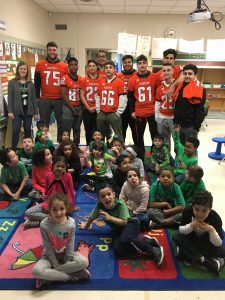Welcome to Haigh School
Summer Stem and Book Pop UP!
How to Encourage Summer Reading: A Parent’s Guide
How to Encourage Summer Reading: A Parent’s Guide May 21, 2018
Summer is almost upon us. The days are growing longer, the sun is higher in the sky, and soon school will be over for the year. Our children’s thoughts now turn to swimming, skateboards, baseball, and bike riding.
Unfortunately, for far too many of kids, summer vacation is a time for forgetting. You’ve probably heard that “if you don’t use it, you’ll lose it.” That’s certainly true about reading. Kids who don’t read over the summer regress. Their hard-earned reading skills decline.
Boys and girls who manage to keep the rust off their reading, don’t suffer a summer reading drop. By reading and writing throughout the summer, they may even manage to improve in reading. Summer reading is easy to build into a family schedule, and most kids come to really enjoy it.
Here are ten ways to make literacy an enjoyable part of your kids’ summer:
1. Go to the library and borrow some books.
When I was a boy, my mom would take me to the library once a week. I could borrow as many books as the library would allow. It didn’t take much time, but it sure gave me plenty of opportunity for fun reading.
2. Pick out a good chapter book to read to or with your child.
Find a good book to read with your kids. This may be a book that you want to read to them or one for them to read to you (or a bit of both). It can be hard to find time to work all the way through a chapter book during the school year, but it can be easier during the summer months. Books by Roald Dahl and E.B. White were especially popular in our household, but here are some other possibilities:
Kindergarten through Grade 3
- Star Jumper by Frank Asch
- Winnie the Pooh by A.A. Milne
- The Giggler Treatment by Roddy Doyle
- The Mouse and the Motorcycle by Beverly Cleary
- Charlotte’s Web by E. B. White
- Little House on the Prairie by Laura Ingalls Wilder
- The One and Only Ivan by Katherine Applegate
- The Adventures of Captain Underpants by Dav Pilkey
Grades 4-6
- The Lion, the Witch and the Wardrobe by C.S. Lewis
- Treasure Island by Robert Louis Stevenson
- The Secret Garden by Frances Hodgson Burnett
- The Last of the Mohicans by James Fennimore Cooper
- A Wrinkle in Time by Madeleine L’Engle
- The Red Pony by John Steinbeck
- The Jungle Book by Rudyard Kipling
- Sounder by William H. Armstrong
Also, ask your librarian for recommendations, or check out these resources:
3. Celebrate the completion of a book.
With my daughters, when we’d finish a chapter book, we’d have a family celebration. Sometimes we’d rent a video of the book that we’d read and pop some popcorn. Other times it might be a trip to a museum related to the book’s content or a backyard camping trip or perhaps a cooking experience. One year we even picked our family vacation based on a book we’d read (Misty of Chincoteague).
Some children’s chapter books that have been into films include: Fantastic Mr. Fox, Black Beauty, The Hobbit, Bridge to Terabithia, Alice’s Adventures in Wonderland, Harry Potter, Johnny Tremain, Jumani, Mary Poppins, Mrs. Frisby and the Rats of NIMH, Harry Potter, My Side of the Mountain, and many more.
4. Write a letter to your child and drop it in the mail.
Kids love to get mail. I know in our digital age people write fewer real letters, but a letter can be a surprising and stimulating experience for children. Who doesn’t like to get a personal letter? Write a letter that requires some response: What do you most want to do this summer? What are you reading now? What’s that about? Etc.
5. Start a diary.
When we’d go on summer vacation, we always brought along a composition book. When our kids were little, at the end of the day, we’d let them dictate their diary and we’d print out their memories for them. As they developed their own ability to write, they recorded their own trip memories. We’d leave places to tape in postcards and the like.
6. Schedule a daily reading time.
I mentioned that my mom used to take me to the library. That same summer she required that I stay in after lunch for 30 minutes to read. At first, I was resistant, wanting to get out with my friends. It wasn’t long before I cherished the time, however. Summer can get kind of boring for kids and having regularly scheduled activities helps. Parents are often good at loading up kids’ schedules with things like soccer or swimming—which are great—but schedule in some quiet reading time too, they’ll come to appreciate it.
7. Subscribe to a magazine.
We tend to champion book reading. And why not? There are so many great books. However, children’s magazines are fun too, and they change things up and bit which can encourage kids to read.
There are lots of good choices of kids’ mags. Here are a few suggestions: Highlights, National Geographic Kids, Ranger Rick, Boy’s Life, American Girl, Sports Illustrated for Kids, Cricket, Cobblestones, Dig. Pick one that fits your child’s interests.
8. Encourage book clubbing.
Some kids find reading to be lonely. There are things that you can do to make it more social and fun for them. For instance, get your child and his/her friends to agree to read a particular book each month. Then have a get-together—perhaps a sleepover— at your house for the kids to share their favorite snacks and talk about the book.
9. Encourage your child to read and use “to do” books.
Kids love to get their hands dirty. Doing stuff is fun. Use reading as a jumping-off-point for arts and crafts activities, sports, cooking, science experiments, etc.
Here are some terrific “to do” book suggestions:
- Rosie Revere’s Big Project Book for Bold Engineers
- American Girls’ Handy Book
- American Boys’ Handy Book
- Baking Class: 50 Fun Recipes Kid Will Love to Bake
- The Everything Kids’ Science Experiments Book
10. Family reading time.
Parents can get in on this reading thing, too. Maybe one night a week, try turning off all the screens, and everyone pick up a good book or magazine; 15-30 minutes. Not only does that create some good reading practice time for your kids, but it shows them that you’re into this reading thing too, which can encourage reading. Modeling will always be more powerful than telling. If you get into reading, they will, too.
Dearborn Public Libraries Summer Reading Program
Keep your child’s summer reading inspired with these free programs sponsored by your Dearborn Public Libraries. All programs are a part of the summer reading programs held each year and are free to the public, serving all ages in all locations! Click here to check out this year’s programs.
Prevent Summer Reading/Writing Loss-ReadWorks-Free
Dear Parent/Guardian,
Summer is a great time to support your child’s reading progress! Students who don’t read much over the summer show a decline in reading performance from the end of one year to the start of the next. Reading over the summer can help your child maintain the reading gains they made during the year AND also help prepare them for next year!
Here are a few simple ways for you to help:
- Create your free Parent/Guardian account on ReadWorks.org
ReadWorks is a nonprofit that provides educators with thousands of free, high-quality nonfiction and fiction articles with questions and activities. ReadWorks is inviting you – all parents & guardians – to create your own free account to help your child stay on track this summer, and all year round!
- Go to www.readworks.org
- Click on “I’m an Educator” (parents are educators too!)
- Click on the blue “Sign Up”
- Make sure to choose “Parent/Guardian” as your role
- Print Free Summer Reading Packets Now – www.readworks.org/summer-reading
To make summer reading easy, ReadWorks has curated interesting and knowledge filled summer reading packets on a range of levels that you can print and download for free!
Keep these tips in mind when using ReadWorks this summer:
TIP 1: Summer reading should be accessible and enjoyable, so be sure to choose articles that are at your child’s reading level. Don’t be afraid to start with articles from lower grade levels. The important thing is that students, read, read, read!
TIP 2: Aside from giving your child access to these high-quality texts, helping them keep track of their summer reading and discussing what they’ve been read with family members can also go a long way!
I hope you and your family have a great summer!
Summer Literacy Challenge- Growing strong readers
Save the Wolf?
It’s time for the Penny/Nickel challenge!
This week, we are continuing our endangered animal adoption project. We are reusing milk jugs to collect money for adopting a wolf through the Detroit Zoo, and we need your help!
We are asking for your help with our penny/nickel challenge.
Bring in as many extra pennies or nickels as you can to help fill our jugs! At the end of the week, we’ll count up the totals and announce our winners!
Did you know???
A single wolf can eat up to 20 pounds of food in one sitting!
Literacy Advice for Families from Reading Rockets
Literacy advice for families
Literacy tips for early readers
- Point out print in the child’s environment: on cereal boxes, food labels, toys, restaurants, and traffic signs.
- Sing songs, say short poems or nursery rhymes, and play rhyming words games with your child.
- Tell stories to your child.
- Read aloud to your child. Point to the words on the page as you read.
- Read a short passage several times to your child until your child can read it with you. Then encourage your child to read the passage to you.
- Encourage older children to read with younger children.
- Encourage your child to read (or pretend read) to you. Make this reading enjoyable. Don’t worry if your child does not read all of the words correctly but, rather, applaud your child’s efforts to read.
- Go to the library together.
- Have books, magazines, and newspapers around the house. Let your child see you reading.
- Encourage your child to write messages such as grocery lists, to-do lists, postcards, or short messages to family members or friends. Don’t worry about conventional spelling at this point but, rather, encourage your child’s first efforts at authorship.
- When watching television, have the captioning feature enabled so that the children view the words while hearing them performed aloud.
Literacy tips for more advanced readers
- Talk to your child about what he or she is reading. Ask open-ended questions such as “What do you think about that story?” “What would you have done if you were that character?”
- Make reading and writing a regular part of your daily home activities. Let your child see you using reading and writing for real purposes.
- Visit the public library. Help your child to get his or her own library card.
- Read to your child regularly, even after your child is able to read some books independently.
- Listen to your child read. Use strategies to help your child with tricky words. For example, when your child comes to an unfamiliar word, you might say, “Skip it and read to the end of the sentence. Now try again – what makes sense and looks like the word that you see?”
- Praise your child’s efforts at reading.
- Play word games such as thinking of different words to describe the same things.
- Support your child’s writing. Have writing materials such as paper, markers, and pencils available. Read what your child writes.
- Set reasonable limits for television viewing.
Adapted from Mraz, Padak, & Baycich (2002).


